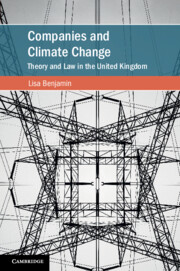Book contents
- Companies and Climate Change
- Cambridge Studies on Environment, Energy and Natural Resources Governance
- Companies and Climate Change
- Copyright page
- Dedication
- Contents
- Acknowledgements
- 1 Introduction
- 2 Theorising the Company in the Context of Climate Change
- 3 English Company Law and Climate Change
- 4 International and Transnational Climate Change Law and Policies
- 5 Domestic Climate and Energy Regulation
- 6 Companies, Human Rights and Climate Litigation
- 7 Fiscal Barriers and Incentives to Corporate Climate Action
- 8 Conclusion
- Index
1 - Introduction
Published online by Cambridge University Press: 09 April 2021
- Companies and Climate Change
- Cambridge Studies on Environment, Energy and Natural Resources Governance
- Companies and Climate Change
- Copyright page
- Dedication
- Contents
- Acknowledgements
- 1 Introduction
- 2 Theorising the Company in the Context of Climate Change
- 3 English Company Law and Climate Change
- 4 International and Transnational Climate Change Law and Policies
- 5 Domestic Climate and Energy Regulation
- 6 Companies, Human Rights and Climate Litigation
- 7 Fiscal Barriers and Incentives to Corporate Climate Action
- 8 Conclusion
- Index
Summary
This introductory chapter frames the issue of companies and their role in the climate crisis. It lays out the science of climate change and the causal connection between the historic and present contributions of companies to climate change through their greenhouse gas emissions. The chapter highlights the global temperature goals under the Paris Agreement and the consequential emission reductions it necessitates. This chapter also introduces some key concepts in company law theory such as shareholder primacy and shareholder wealth maximization and their role in Anglo-American company law. The chapter provides an explanation of a number of corporate forms, including traditional for-profit corporate models (both private and public) as well as a variety of hybrid and social enterprise forms. The imperatives of profit making, as illustrated by dominant corporate norms, are relevant (in varying degrees) to all of these corporate forms. The chapter concludes with a summary of systemic barriers of short-termism as well as opportunities such as corporate social responsibility and societal expectations which surround companies in the context of climate change, and why the United Kingdom is used as a model jurisdiction.
Keywords
- Type
- Chapter
- Information
- Companies and Climate ChangeTheory and Law in the United Kingdom, pp. 1 - 19Publisher: Cambridge University PressPrint publication year: 2021

